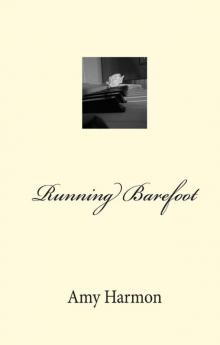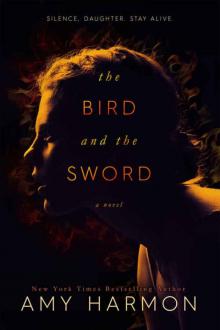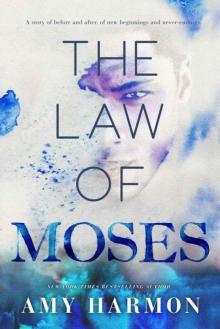- Home
- Amy Harmon
A Different Blue Page 6
A Different Blue Read online
Page 6
The class was in hysterics by now, and it was all I could do not to laugh with them. It was like a different language. As different as Wilson was from all the boys I'd ever known. And it wasn't just they way he talked. It was him. His light and his intensity. And I hated him for it. I rolled my eyes and groaned and snarled whenever he asked me to participate. And he just kept his cool, which made me even more “brassed off.”
My irritation only increased as Wilson proceeded to introduce a “special visitor,” a blonde girl named Pamela who presented a power point on Roman architecture from her recent trip. Her last name was Sheffield, as in the Sheffield Estates – a popular hotel in Vegas that was designed to look like an English estate. Her family had apparently built the hotel that still bore her last name. Apparently they had hotels all over Europe. Pamela told us she had majored in International Hotel Management and traveled to all the different hotels owned by her family, one of which was near the Colosseum in Rome. She sounded exactly like Princess Diana when she talked, and she was elegant and glamorous and said words like “beastly” and “brilliant.” Wilson introduced her as his “friend from childhood,” but she looked at him like she was his girlfriend. It made more sense that he was in Boulder City if his girlfriend worked for the Sheffield Estates.
Pamela droned on about this or that stunning example of Roman ingenuity, and I despised her cool loveliness, her knowledge of the world, her obvious comfort with herself and her place in the universe, and I taunted her a little during her presentation. It was easy to see why Wilson would like her. She spoke his language, after all. It was one of youth and beauty, of success and entitlement.
In another time, she and Wilson would have been the conquering Romans, and I would have been a leader of one of the savage tribes that attacked Rome. What had Wilson called them? There were several. The Visigoths, the Goths, the Franks, and the Vandals. Or maybe I would be a Hun. Attila's girlfriend. I could wear a bone in my hair and ride an elephant.
In the end, the tribes had overrun Rome, pillaging it and burning it to the ground. That pleased me on some level. The underdogs rising up and conquering the conquerers. But if I was completely honest with myself, I didn't want to conquer Wilson. I just wanted his attention. And I got it in the most obnoxious ways. He usually was a fairly good sport about it, but the day Pamela came he held me after class.
“Miss Echohawk – hold up a minute.”
I groaned, falling back away from the door where I was steps away from making my exit. I got a few smirks from some of the other kids as they vacated the room. They all knew I was in trouble.
“I thought we discussed the Miss Echohawk thing,” I growled at him when the room had emptied around us.
Wilson started gathering up the papers littering the desks, pushing and straightening as he went. He didn't say anything to me but there was a deep furrow between his brows. He looked kind of . . . . . . pissed – the American definition.
“Am I missing something?” His voice was subdued, and when he finally looked up at me his eyes were troubled.
I tossed my hair and shifted my weight, popping one hip out the way we girls do when we're aggravated. “What do you mean?”
“Why are you so angry?”
His question surprised me, and I laughed a little. “This isn't angry,” I smirked. “This is just me. Get used to it.”
“I would really rather not,” he replied mildly, but he didn't smile. And I felt a stab of something close to remorse. I tamped the feeling down immediately. I shifted my weight again and looked away, communicating that I was done with this conversation.
“Can I go now?” I asked sharply.
He ignored me. “You don't like me. And that's all right. I had teachers I didn't much care for in school. But you are constantly looking for a fight . . . and I'm not sure I understand why. You were rude to Miss Sheffield today, and I was embarrassed for you and for her.”
“People like Miss Sheffield need to be given a hard time every once in a while. It's good for her. It'll toughen her up, help her grow hair on her chest, develop a little muscle,” I smirked.
“What do you mean, people like Miss Sheffield?”
“Come on, Wilson!” I moaned. “You know exactly what I mean. Haven't you ever noticed all the little groups, all the little cliques in your own classroom? Over here we have the athletes.” I walked to a grouping of desks on the back row. “Here we have the pom poms and the Prom Queens.” I pointed as I strolled. “The nerds usually congregate here. The bitchy girl – that'd be me – sits here. And the kids that don't have a clue who or what they are fill in all the spots in between. Maybe you don't recognize these little divisions because people like you and Miss Sheffield have your own status. People like you don't have a group because you float above the groups. You're from England. You should know all about class structure, right?”
“What in the world are you going on about?” Wilson cried out in frustration, and his obvious upset just spurred me on.
“Jimmy, the man who raised me, told me a story once,” I explained. “It goes right along with the whole tribal thing we've been talking about. Romans vs. Goths, vs. the Visigoths vs. everyone else. It's the reason people fight. It's an Indian legend his grandfather told him. He said Tabuts, the wise wolf, decided to carve many different people out of sticks. Different shapes, sizes, colors. He carved them all. Then the wise wolf put all the people he'd created into a big sack. He planned to scatter them all over the earth evenly, so every person he created would have a good place to live, plenty of space, plenty of food, and plenty of peace.
“But Tabuts had a younger brother named Shinangwav. Shinangwav, the coyote, was very mischievous and liked to cause trouble. When Tabuts, the wise wolf, wasn't looking, Shinangwav made a hole in the sack. So when the wise wolf tried to scatter them, instead of everyone getting their own little space, the people fell out in bunches.”
Wilson stood very still, his grey eyes trained on my face, and I realized I had his attention now, whether I wanted it or not.
“Jimmy said this explains why people fight. They don't have sufficient space, or maybe someone else fell on a better plot of ground, and we all want the land or possessions someone else got – simply by the luck of the draw. So we fight. You and Pamela are the same kind of people. You're from the same bunch,” I finished, defiant.
“What's that supposed to mean, Blue?” Wilson wasn't defiant. He looked upset, hurt even.
I shrugged tiredly, my anger fizzling like a leaky balloon. Wilson was a smart man. It wasn't exactly hard to decipher my meaning.
“But if we're all carved by the same wise wolf,” Wilson persisted, using the story to make his point, “why does it matter where we were scattered?”
“Because so many people suffer while others seem to have it so easy. And it doesn't make much more sense to me than that Indian legend.”
“So you're angry because of where you were scattered. And you're angry with me – and Pamela as well – because we grew up across the pond in a life of leisure and privilege.”
The way he summed it up made me sound prejudiced. But I kind of was, so maybe that was fair. I shrugged and sighed, and Wilson clasped his hands in front of him, his eyes earnest.
“None of us can help where we were scattered, Blue. But none of us has to remain where we were scattered. Why don't you focus on where you're going and less on where you come from? Why don't you focus more on what makes you brilliant and less on what makes you angry? You are missing a key element to the story. Maybe the moral of the legend is that we are all carved, created, and formed by a master hand. Maybe we are all works of art.”
I groaned. “Next you're going to tell me to just be myself and everyone will love me, right?”
“Love might be too strong a word,” Wilson retorted, dead pan. I snickered.
“I'm serious!” I argued, smiling in spite of myself. “All that stuff people say about just being yourself is complete–”
“Rubbish?�
��
“Yeah. Being yourself only works if you don't suck. If you do suck, definitely don't be yourself.”
It was Wilson's turn to groan, but I could tell he had forgiven me, and my heart softened the smallest degree.
“What was that 'Nobody' poem you quoted the other day? I think that is probably more accurate.”
“Dickinson's poem?” Wilson looked absolutely tickled that I'd remembered. And then he recited it, his eyebrows raised as if he was certain I couldn't be referring to Dickinson.
“I'm nobody! Who are you?
Are you nobody, too?
Then there's a pair of us
Don't tell—they'd banish us, you know.”
I nodded. “Yep. That's the one. I think old Dick and I would have been good friends, because I'm definitely a nobody too.”
“Old Dick is actually Emily Dickinson.” Wilson's lips twitched. I knew darn well who wrote the poem, but I found I liked making him laugh.
“The beauty of that poem is that everybody can relate, because we all feel like nobody. We all feel like we are on the outside, looking in. We all feel scattered. But I think it's that self-awareness that actually makes us somebody. And you are definitely somebody, Blue. You may not be a work of art, but you are definitely a piece of work.”
Chapter Six
November blew in, and the sunlight changed and mellowed. The desert heat became muted and soft, and though Vegas and Boulder City had more palm trees than changing leaves, the fall was a beautiful respite. Mason started coming around more often, and as long as I was on the back of his bike, riding through the desert, being with him was something I enjoyed. It was when the ride was over, when our passion was spent, when we were breathing hard, lust sated, that I had nothing to say. I was always eager to leave or ready for him to go. I never pretended to love him or want anything from him, and he seemed satisfied with what I was willing to give.
I guess that's why it surprised me when his brother Brandon showed up out of the blue on a Thursday night. Manny and Graciela were at my apartment watching American Idol, Manny's favorite show. Manny was convinced he was a better singer than almost every one of the contestants, and would demonstrate his skill on commercial breaks, standing on the couch with his hand clenched around an invisible microphone. He wasn't bad, and what he lacked in talent he made up for in personality. Usually Graciela was his biggest fan, but she was been jittery and kept looking at her phone and pacing back and forth.
Graciela had been getting on my nerves lately. She had started straightening her curly black locks so they hung down her back and parting her hair on the side so her long bangs played peek-a-boo with her left eye. Just like mine. When the school year started the only makeup she had worn was lip gloss and masacara. But that had changed, too. Her eyeliner was thick and black, her lashes curled and coated, her eyeshadow smokey and dark. Her jeans were tight, her shirts fitted, and she'd even found a pair of sky high boots in a size 5. She weighed maybe 90 pounds and had no hips or breasts, and the clothing and makeup made her look like she was all dressed up for Halloween. It was not hard to figure out that she was trying emulate me, but she looked ridiculous, and for the first time I wondered if maybe I did too.
When the doorbell rang, Graciela sprang from the couch and ran for the bathroom, squealing like Justin Bieber was at the door.
“What in the world is up with her?” I growled, annoyed.
“It must be hormones,” Manny sighed, like he knew all about women's hormones.
“Oh, yeah? Is that why she's become mini me? Hormones?” I stomped to the door and jerked it open, thinking the neighbors had grown tired of hearing Manny sing at the top of his lungs and were coming to complain.
Brandon Bates and two of his buddies stood at my door, matching smirks on their faces.
“Hey, Blue,” Brandon grinned, his eyes on my tank top and the brief cotton shorts I had changed into after work. His friends seemed equally interested in my outfit.
I was taken aback, and for a second I didn't quite know what to say.
“Uh, hi, Brandon. What are you guys doing here?” My greeting wasn't exactly welcoming, but Brandon stepped through the small opening like I'd just invited him in. I yielded in surprise as he strode into the apartment like he owned the place, Cory and Matt at his heels. They all made themselves comfortable on the couch, eyes on the TV, as if they were going to stay for awhile.
Manny was all smiles and happy hellos, thrilled that Brandon Bates was here to watch his favorite show with him. Graciela slunk out of the bathroom, hugging the walls like a shy puppy and perching on the armrest closest to Brandon.
“Hi, Brandon,” she purred, her eyes glued to his face, her breathing shallow.
Gracie's skittish behavior suddenly made sense. She had known they were coming. What was she thinking? That we were all going to hang out? The way her eyes clung to Brandon made her feelings fairly obvious. But I knew for a fact Brandon wasn't interested in Gracie. Thank God. In fact, he'd been flirtatious and suggestive toward me on several occasions, and I wondered at what point Mason would see his brother as a possible threat.
“So, Blue,” Brandon suggested after a few minutes. “I was thinking you and I could take a drive or something. Cory and Matt will babysit if you want to take off.”
Manny huffed in indignation at the term babysitting, and Cory's eyebrows shot up like that wasn't what he had planned on at all.
“Brandon!” Matt warned.
“Brandon!” Graciela cried, as if Brandon had slapped her. Then she shot me a look of such venom that I fell back a few steps.
“Does Mason know you're here, Brandon?” I said flatly.
“Mason says you and he have an arrangement, not a relationship, so I doubt he'd care.” Brandon smiled at me like it was my lucky day. Gracie glowered at me like I had stolen her soulmate. Time to send everyone home.
“Really, Brandon?” I cooed. “I don't remember you being part of that arrangement, so I think I'll pass on that ride. And look at the time! Darn it, my aunt is gonna be home soon.” It was a lie, but Brandon wouldn't know that.
“You guys better head out.” I opened the door and looked at them, one eyebrow raised expectantly. Matt and Cory stood obediently, but Brandon looked a little peeved. He was slower to rise, and I thought for a minute I might have trouble on my hands.
“I'll walk you out, Brandon,” Graciela purred and rose to her feet beside him. Manny's brotherly instincts finally kicked in, and he stood abruptly and grabbed Graciela by the hand.
“Come on, Gracie. We need to go, too.” Gracie yanked her hand away, and Manny's eyes flashed. He spit something out in fiery Spanish and Gracie snarled back at him like a cornered cat, but she let him pull her from the apartment.
“I'll text you, okay, Brandon?” Gracie flung the words over her shoulder, and Brandon's friends snickered as Manny launched into another tirade that faded away with their footsteps. Brandon and his friends followed them out, and I breathed a small sigh of relief.
Brandon said something under his breath, and the snickers became snorts and sly suggestions. They jostled each other as they headed down the sidewalk leading away from my apartment.
“Hey, Brandon,” I called after them. “Stay away from Gracie, please.”
“Gracie isn't the one I'm interested in, Blue,” Brandon called back. “You let me know when you're ready to take that ride, all right?”
I shut the door in response.
“Joan of Arc was born in 1412 in a little village in eastern France. Her family was poor, and they lived in a region that had been ravaged by conflict. Three years after Joan's birth, England's King Henry the fifth invaded France and defeated the French at Agincourt, leaving the country very divided.” Wilson's hands were shoved into his pockets, his eyes serious as he gazed at his class.
“In surviving documents, Joan has been described as resembling a mere 'shepherd girl.' But to me she is one of the most fascinating people in history. At thirteen she began ha
ving visions of a religious or spiritual nature. She described them as admonitions to be good or pious, to go to church. Very simple, as far as visions go.” Wilson smiled, a quick flash of straight white teeth, a concession to the fact that visions weren't commonplace or simple at all. “It wasn't until she was closer to sixteen years old when the visions changed. She started getting specific instructions to 'go to France.' She obeyed.
“Joan of Arc was sixteen years when she petitioned Charles de Ponthieu, beliguered heir to the throne, and told him she had been sent by God to help him. Can you imagine a girl of our day going to the President of the United States and telling him she was sent by God to assist him? I submit that it wasn't any less dramatic for young Joan to petition a king. The fact that she was even granted entrance is remarkable. She was actually turned away twice before she was finally successful. But eventually Joan was able to convince Charles that she was sent by God by relaying a prayer that he had recently given asking God if he was the rightful heir to the throne and if he wasn't that he would suffer and not his people. She told him God had heard him, and he was indeed the rightful King.
“She sent a letter to the English, telling them that the King of Heaven and son of Mary, even Jesus Christ, supported the claim of Charles to the French throne and that they should go back to England. She was also given control over an army and allowed to lead them into battle. A seventeen-year-old peasant girl!” Wilson looked around the room at his audience, many of whom were seventeen years old themselves.
“Joan became an almost mythical leader among those who fought against English rule. People were in awe of her wisdom and knowledge and her spiritual maturity. She gave them something to believe in and something to fight for. Within a year, Joan of Arc had led the French army to victories at Orleans, Patay, and Troyes. Many other towns were also liberated from English control, making possible the coronation of King Charles VII in July of 1429. However, a year later Joan was captured and sold to the English.

 Prom Night in Purgatory
Prom Night in Purgatory Running Barefoot
Running Barefoot The Queen and the Cure
The Queen and the Cure The Smallest Part
The Smallest Part The Bird and the Sword
The Bird and the Sword The Song of David
The Song of David Infinity + One
Infinity + One The Law of Moses
The Law of Moses A Different Blue
A Different Blue From Sand and Ash
From Sand and Ash What the Wind Knows
What the Wind Knows Slow Dance in Purgatory
Slow Dance in Purgatory Romance Through the Ages
Romance Through the Ages